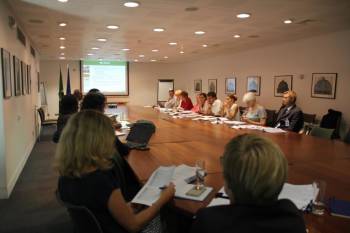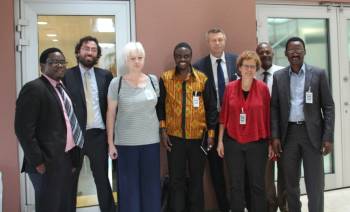Stakeholder meeting on land & pastoralism during MEP visit to Tanzania
On 20 September 2016, CELEP organised a stakeholder meeting for its members, partners and local civil-society representatives at the delegation of the European Commission in Dar es Salaam, Tanzania.
This meeting was held on the occasion of an official visit of members of the Development (DEVE) Committee of the
European Parliament to Tanzania. The delegation was composed of the following Members of the European Parliament (MEPs):
- – Linda McAvan (S&D, UK), president of the development committee of the European Parliament. Unfortunately she couldn’t join the meeting
- – Maria Heubuch (EFA, Germany), member of the development (DEVE) and agriculture committee of the European Parliament. She can be considered a CELEP pastoralist “champion” and has a good knowledge and understanding about pastoralism
- – Lola Sánchez Caldentey (GUE, Spain), member of DEVE committee and of the delegation for relations with the People’s Republic of China
- – Bogdan Brunon Wenta (EPP, Poland), member of DEVE committee and JPA ACP-EU.
- – Eleni Theocharous (ECR, Cyprus), member of the DEVE committee
The local partner organisations and European member organisations of CELEP that wer e invited included: Oxfam, ActionAid, CARE, Mviwata, Pastoralist Indigenous Non-Governmental Organisations (PINGOs) Forum, Tanzania Natural Resource Forum, Hakiardhi and the Ujamaa Community Resource Team (UCRT). The meeting was facilitated by Pablo Manzano on behalf of CELEP.
e invited included: Oxfam, ActionAid, CARE, Mviwata, Pastoralist Indigenous Non-Governmental Organisations (PINGOs) Forum, Tanzania Natural Resource Forum, Hakiardhi and the Ujamaa Community Resource Team (UCRT). The meeting was facilitated by Pablo Manzano on behalf of CELEP.
Pablo started the meeting by welcoming everybody and presenting CELEP. He then made a presentation on key issues related to pastoralism and particularly about problems of land access in the region. In his presentation, which can be found here, he focused on the economic importance of pastoralism and its potential to alleviate poverty. He also pointed to the linkages and comparisons that can be made between African and European pastoralists – an entry point of interest for the MEPs. In his final slides, Pablo argued that the European Union (EU) has considerable potential to help create an enabling environment for pastoralist development. He highlighted the importance of pastoralism in terms of export earnings for many African countries and, in particular, the huge demand for livestock coming from the Gulf countries.
Then Joseph Olila from the Tanzania Natural Resource Forum took the floor. In his presentation, he covered several issues but focused on the Tanzanian law allowing for land leases but not land ownership.
The subsequent discussion revolved around animal diseases such as brucellosis and the organisation of veterinary services in Tanzania, but also land issues and human rights. One MEP argued that fencing would be good for animal health surveillance; this led to several counter-arguments by CELEP partners and members attending the meeting. The MEPs expressed interest in the parallels between African and European pastoralism and inquired about existing policy arrangements for pastoralists in Africa. In response, the representatives from civil-society and community-based organisations informed the delegation about the African Union’s Policy Framework on Pastoralism. The discussion on land focused on issues of communally held land and the problem that grazing areas are not protected by law. It is always assumed that pastoralism destroys the environment, and many government “development” strategies undermine livestock mobility, either directly or indirectly. During the discussion, several participants mentioned the importance of the Voluntary Guidelines on the Responsible Governance of Tenure of Land, Fisheries and Forests in the Context of National Food Security (VGGT).
Thus, CELEP managed to raise awareness on pastoralism and land issues with several delegates of the DEVE Committee of the European Parliament. The next step will be to see how to take this up and make use of these newly established contacts to advance pastoralism in Eastern Africa in EU development and domestic policies. Contacts will be maintained in Brussels with the MEPs who took part in the visit to Tanzania.
Posted on 16 November 2016 in News
